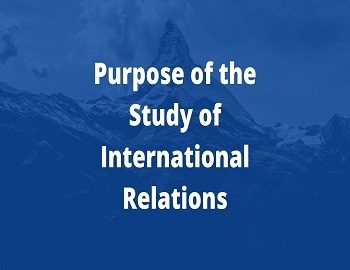Purpose of the Study of International Relations:
These days relations among states have become more complex and there is a real need to study these in a systematic presentation of the subject. In fact, the study of International relations as an academic field has become very important.
‘Why to study International Relations? ‘or’ What is the use or purpose of its study?’ are some of the important questions which required to be answered. A UNESCO report of 1854 answers the same question in the following words; “the case for the teaching of International Relations is a part of the case for a teaching of the social sciences in general that case rests at bottom upon an article of faith, namely, that the better the world is understood by the better people in it, the better for the world will it be”. The following are some of the uses or the purposes for the study of International Relations-
(1) The study of International Relations tells us how men and nations act in given circumstances. It tells us what conditions should be discouraged or encouraged to promote international harmony.
(2) It tells us that many problems of International Relations under the present situation are not easy to be solved. “The plain fact is that we are living in a very complicated and dangerous world. There are few if any easy, just and completely satisfying solutions to the great problems that face us today”. In fact, the basic agreement may never be reached between communist and non-communist worlds. But this does not mean that war is inevitable. However, the study of International Relations tells us that there is a hope that war can be kept under control and that total war under the present situation can be avoided.
(3) The study of International Relations tell us that student of International Relations must always try for objectivity. They must carry out their work in the face of obstacles and vested interests. They must beware of simple solutions to complex problems.
(4) The study gives us an understanding of the world as it is and at the same time keeps our eye on the world as it should be. But it warns in that what ‘must be’ will in fact occur.
(5) The students will learn that diagnosis of the ills of the world is not a difficult task and that most people can achieve it to their own satisfaction. The student will learn the acceptability conditions of every proposal for international action, and that it so screens every venture that the only striving one areas those possessing the rare quality of universal self-interest.
(6) The study of International Relations also tells us that national interests are interpreted by states alone and not by the ‘organized conscience of mankind’ and that propaganda can poison as well as ‘inspire’ and that it can upset all expectations regarding the actions of a nation that states can move in countless ways to implement their policies through economic, political and cultural pressures.
(7) Another purpose of its study is that it provides assistance to statesmen and politicians in the conduct of international relations. It also gives assistance to experts and advisors in the carrying on of their professional work relating to international affairs. It helps them in the making of decisions.
(8) The study of International Relations is also useful as it contributes much to the day to day conduct of international affairs, whether by national or international officials. It helps in the practical activity of military men, diplomats, international lawyers, international propagandists, and international educators. The study helps these men in four ways as described by Prof. Quincy Wright-
- To define situations which have to be dealt with.
- To obtain relevant objectives.
- To formulate objectives.
- To make decisions initiating action.
(9) The study of International Relations serves, on the one hand, to make men aware of their participation in the universal society and of the direction in which that society is moving, and on the other, to indicate gaps in knowledge both theoretical and practical.
Conclusion- To conclude this discussion of the purpose of the study of International Relations, we may say that it is useful for all walks of people. It proves very useful for general education to the citizens. The students of International Relations should pursue this study with a sensible appraisal of the results to be achieved. Palmer and Perkins have rightly remarked, “He must not assume that hard work and consecration will lead inevitably to the solution of the many problems of the international society…..Instead, he is endlessly concerned with emotions, personalities, traditions, motivations, and a host of other intangible and changing factors”.









Comments (No)